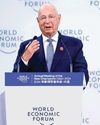
Why won't antisemitism die, or at least die down?
In the months following Hamas' attack on Israel on Oct. 7, 2023, antisemitic incidents increased substantially. The Anti-Defamation League, which keeps track, says they tripled in the U.S. over the previous year, although its criteria also changed to include anti-Zionism. But from 2019 to 2022, the amount of people with highly antisemitic attitudes in the U.S. had nearly doubled, the ADL found. In Europe, Human Rights Watch warned in 2019 of an "alarming" rise in antisemitism, prompting the European Union to adopt a strategic plan for fighting it two years later.
No one can say definitively why the pre-Gaza War surge happened when it did. The salience of groups like the neo-Nazis who marched in Charlottesville, Va., in 2017 probably played a role, as did the influence of figures like the troubled rapper turned-designer Kanye West. Historically, antisemitism has been a side effect of populism, which traffics in us-vs. - them stereotypes. Social media allows antisemitic influencers to recruit and communicate directly to followers, getting around the filtering bottleneck of the legacy media. The murder of 11 worshipers at the Tree of Life synagogue in Pittsburgh in 2018, by a shooter enraged at Jewish groups providing aid to immigrants, was the painful lowlight of this era.
This story is from the March 11, 2024 edition of Time.
Start your 7-day Magzter GOLD free trial to access thousands of curated premium stories, and 9,000+ magazines and newspapers.
Already a subscriber ? Sign In
This story is from the March 11, 2024 edition of Time.
Start your 7-day Magzter GOLD free trial to access thousands of curated premium stories, and 9,000+ magazines and newspapers.
Already a subscriber? Sign In

Q & A: Borge Brende
The World Economic Forum president talks with TIME editor Sam Jacobs

Q & A - Rene Haas
Arm's CEO on how his hardware is supporting the Fourth Industrial Revolution

The conflicts looming over 2025
WHEN DONALD TRUMP TOOK THE OATH OF OFFICE AS President in January 2017, his first foreign policy priority was to get tough on China. The Trump 2.0 Administration will continue that work. But when he strides back into the Oval Office in January 2025, Trump will also become responsible for U.S. management of two dangerous wars, the kinds of hot foreign policy crises he was fortunate to avoid during his first term.

Rev Lebaredian
Nvidia's vice president of Omniverse and simulation technology on training AI-powered robots

5 predictions for AI in 2025
New uses and policy questions come into focus

Roy Wood Jr. The comedian on his new stand-up special, the importance of working in food service, and learning from Keanu Reeves
8 QUESTIONS WITH Roy Wood Jr.

A call for global cooperation in the Intelligent Age
Cultivate wisdom along with innovation

The D.C. Brief
IN THE END, THE THREAT OF A FARright revolt proved more menacing than most imagined, as Republican Mike Johnson initially came up short on Jan. 3 during the first balloting to keep him as Speaker.

The digital labor revolution
OVER THE PAST TWO YEARS, WE'VE WITNESSED advances in AI that have captured our imaginations with unprecedented capabilities in language and ingenuity. And yet, as impressive as these developments have been, they're only the opening act. We are now entering a new era of autonomous AI agents that take action on their own and augment the work of humans. This isn't just an evolution of technology. It's a revolution that will fundamentally redefine how humans work, live, and connect with one another from this point forward.

Tech we can trust
Serving humanity's best interests must be at the center of progress